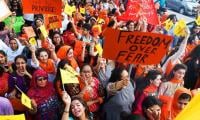ISLAMABAD/PESHAWAR: Minister for Information and Broadcasting has said that in a high-level meeting of the Parliamentary Committee on National Security (PCNS), the top political and military leadership discussed the parameters for the govt-TTP talks, asking for the involvement of Parliament.
They sought the TTP to surrender and accept the Constitution of Pakistan to get amnesty which, however, will not be available to the hardcore terrorists involved in heinous crimes. The military side briefed the political elite about the initiation of these talks and put a few questions before the parliamentary leadership to know their view of the parameters required to be set for a possible deal with the proscribed TTP.
Politicians from both sides of the political divide, including even some federal ministers, pleaded that the issue be placed before Parliament for discussion and to set the conditions for such a deal.
However, what was gathered by sources from the briefing of the military side and the questions and speeches of the political leadership reflects that there was no opposition to talks with TTP. There was almost an agreement that the TTP should surrender and accept the Constitution of the country but there would no amnesty for the hardcore involved in heinous terrorist activities.
Meanwhile, the parliamentary and political leadership, while attending a meeting of the Parliamentary Committee on National Security (PCNS)), expressed satisfaction over Pakistan’s strategy to tackle internal and external challenges being faced by the country.
The PCNS was given a comprehensive briefing by Chief of Army Staff (COAS) General Qamar Javed Bajwa and Director General ISI Lt. General Faiz Hameed on national security and external and internal challenges being faced by the country.
Prime Minister Imran Khan did not turn up in the PCNS committee. The opposition leader in the National Assembly Muhammad Shehbaz Sharif, Bilawal Bhutto Zardari, other members of the National Assembly and Senate, provincial leadership, Prime Minister Azad Jammu and Kashmir, COAS General Qamar Javed Bajwa, DG ISI, Lt. General Faiz Hameed and DG ISPR Major General Babar Iftikhar participated in the meeting.
Foreign Minister Shah Mahmood Qureshi, while coming out of the National Assembly hall, told the newsmen that the COAS responded comprehensively to questions from the parliamentarians. Earlier, he said ISI DG gave presentation to the House on external and internal security issues.
Qureshi said most of the discussion revolved around issues pertaining to Afghanistan, saying the opposition was also taken into confidence on security matters.
Shehbaz Sharif was satisfied with the briefing, saying that it was a good session during which detailed briefing was given while there were also questions and long answers to queries. He said that atmosphere of meeting was good. “The meeting also ended on a good note,” he said. However, he declined to respond to question about government’s talks with TTP, “No Comments,” he said.
Interior Minister Sheikh Rashid Ahmad said the meeting of PNSC was held in a pleasant atmosphere during which participants listened to each other with patience. He said that such meetings should be held from time to time.
The participants were comprehensively briefed about matters pertaining to national security, foreign affairs, internal and external challenges faced by county, a statement issued by the National Assembly Secretariat at end of meeting which lasted for over five hours said. “The participants were also briefed about regional and political challenges especially the situation in Indian Illegally Occupied Jammu and Kashmir (IIOJ&K) and Afghanistan,” the statement said. “It was outlined that Pakistan desires peoples’ representative’s government in Afghanistan and Pakistan would continue all-out support for peace and stability in Afghanistan,” the statement said.
The parliamentary and political leadership was also briefed that Pakistan played a responsible and positive role for peace in Afghanistan. It was further apprised that Pakistan believes that peace in Afghanistan would pave for regional peace and development. The participants of the meeting were further informed that Pakistan is making every effort to ensure that the current situation does not give rise to another humanitarian and economic crisis which would add to the plight of the people and in this regard, Pakistan is in constant touch with the international community.
It was also hoped that the territory of Afghanistan would not be used against Pakistan. The meeting was also apprised about the border control system on the Pakistan-Afghanistan border.
Parliamentary and political leadership expressed satisfaction about Pakistan strategy to tackle internal and external challenges and expressed good wishes for prosperity, development and progress of Afghanistan. They also said that such meetings paved way for harmony and unanimity of views on national issues.
At the end of the briefing, a question and answer session was held in which the members of the committee presented their recommendations.
Khalid Maqbool Siddiqui, the parliamentarian of Muttahida Qaumi Movement Pakistan (MQM-P), while taking advantage of the situation, said since TLP had been removed from the list of proscribed organization, the MQM-Pakistan should also be allowed to open its offices. “What is our fault. We want to play our role as the national political mainstream,” he said.
Ex-MNA of MQM Pakistan, Waseem Akhtar, while talking to a private television channel, said the party was active without its Quaid, adding they should be returned their offices and workers be released.
In the meeting of the Parliamentary Committee, Chairman Senate Sadiq Sanjrani, Leader of Opposition in National Assembly and Senate Shehbaz Sharif and Syed Yusuf Raza Gilani, Deputy Speaker National Assembly Muhammad Qasim Khan, federal ministers Shah Mehmood Qureshi, Chaudhry Fawad Hussain, Chaudhry Tariq Bashir Cheema, Sheikh Rashid Ahmed, Suri, Pervez Khattak, Asad Umar, Shafqat Mahmood, Dr Shireen Mazari, Dr Fehmida Mirza, Ali Amin Gandapur, Murad Saeed, Syed Shibli Faraz, Dr Farogh Naseem, Ejaz Ahmad Shah, Monis Elahi, Noor Haq Qadri, Omar Ayub Khan, Syed Fakhar Imam, Syed Aminul Haq, Adviser to the Prime Minister on National Security Moeed Yousaf, Adviser to the Prime Minister on Parliamentary Affairs Dr Babar Awan, Minister of State for Parliamentary Affairs Ali Muhammad Khan, Chairman Kashmir Committee Shahryar Afridi , Special Assistant to the Prime Minister for Political Affairs Malik Muhammad Amir Dogar, Senate Leader Dr Shahzad Wasim, Members of National Assembly Bilawal Bhutto Zardari, Asad Mehmood, Dr Khalid Maqbool Siddiqui, Ghous Bakhsh Khan Mehr, Amir Haider Azam Khan, Nawabzada Shah Zain Bugti, Members of the Senate Sherry Rehman, Azam Nazir Tarar, Anwarul Haq Kakar, Maulana Abdul Ghafoor Haideri, Syed Faisal Ali Sabzwari, Mohammad Tahir Bizenjo, Hidayatullah Khan, Muhammad Shafiq Tareen, Kamil Ali Agha, Mushtaq Ahmed, Syed Muzaffar Hussain Shah, Mohammad Qasim and Dilawar Khan were present.
Members of National Assembly Shahid Khaqan Abbasi, Khawaja Muhammad Asif, Rana Tanveer Hussain, Ahsan Iqbal Chaudhry, Raja Pervez Ashraf and Hina Rabbani Khar, Syed Naveed Qamar, Mohsin Dawar, Khawaja Saad Rafique, Tariq Sadiq, Syed Fayyazul Hassan, Ms. Aliya Hamza Malik, Senator Mian Raza Rabbani and members of the National Assembly's Defence Committee also attended the meeting.
The meeting was attended by the chief ministers of Sindh, Balochistan, Khyber Pakhtunkhwa, Azad Jammu and Kashmir (AJK) Prime Minister Sardar Abdul Qayyum Niazi.
Meanwhile, Federal Minister for Information and Broadcasting Chaudhry Fawad Hussain on Monday announced ‘complete ceasefire’ with the banned Tehreek-e-Taliban Pakistan (TTP) reached, following the negotiations.
“Under the agreement, the government of Pakistan and banned TTP have agreed upon complete ceasefire,” the minister told the media while referring to the interview of Prime Minister Imran Khan with a foreign television in which he had hinted at these negotiations.
He said the negotiations with TTP were underway and would be carried out in accordance with the Constitution and law of the land. “Obviously, no government can hold such negotiation which contravenes the Constitution and law of Pakistan,” he added. In those negotiations, writ of the state, national security, peace of relevant areas and socio-economic stability would definitely be taken into account, he maintained.
The minister said persons, affected due to TTP in different areas, would not be ignored during the negotiations. Therefore, they were also being taken into confidence, he added.
He said ceasefire would be extendable, keeping in view the progress of negotiations. Authorities of Afghanistan’s interim government did play role of a facilitator in those talks, he added.
Fawad said certainly, it was welcoming to note that after a hiatus, complete peace would eventually return to those areas which had been affected due to TTP.
Meanwhile, the Tehreek-e-Taliban Pakistan (TTP) issued a declaration regarding truce with Pakistan government on ceasefire on Monday on behalf of TTP spokesman.
It says, “As far as TTP is concerned it is formed with Pakistani nation and therefore, it is a Jihadi Tehreek and it always keeps in mind national interests along with other issues. The TTP is ready for such negotiations which lead to everlasting peace across the country.”
The declaration further says, “The parties have agreed on formation of negotiation committees which will try to carry out the process of implementation of demands of parties and chalk out future strategy. The ceasefire will be for one month, from November 9 to December 9, which will be extendable with mutual consent. Parties are bound to follow ceasefire. The Taliban government of Afghanistan is playing a role of mediation between TTP and government of Pakistan.”
Meanwhile, the Pakistani Taliban or banned Tehreek-e-Taliban Pakistan (TTP) on Monday finally announced a month-long ceasefire agreement with Pakistan government, saying they could extend the ceasefire as they started peace negotiations with the government.
The TTP had never in the past declared ceasefire, even though they held peace talks with the government but never succeeded. Pakistani Taliban until now were in a denial position about peace negotiations with Pakistan.
The TTP spokesman Mohammad Khurasani told The News that they announced the ceasefire after their top leadership agreed on peace talks with the Pakistan government. He said the ceasefire will begin from November 9, today (Tuesday) and will continue till December 9. He said the ceasefire could however be extended.
The Taliban spokesman said the Afghan Taliban will facilitate the peace talks between the Pakistan government and Taliban militants. Well-placed sources told The News that most of the issues between Pakistan government and Pakistani Taliban had already been resolved with the help of Afghan Taliban and now they can any time sign the peace accord.
According to sources, the government is likely to release 102 Taliban prisoners, some of them senior militant leaders, as a good will gesture and will hand them over to the Afghan Taliban in Afghanistan. They would then deliver them to the Pakistani Taliban in Afghanistan. It would be a major challenge for the Pakistani Taliban and guarantors to ensure implementation of the ceasefire on all militant factions.
BISP has been using delaying tactics and has failed to make outstanding payment for training services
Commissioner directed district administrations to complete preliminary work and submit reports by Monday
Case was heard by a two-member bench, comprising Justice Syed Arshad Ali and Justice Dr Khurshid Iqbal
Companies have neither paid royalties nor compensated local governments, says Ijaz Ahmad
Federal government, owner of most power companies, faces challenge in resolving debt due to fiscal constraints
Justice Sardar Ijaz Ishaq Khan heard contempt of court case by PTI lawyer Mashal Yousafzai







